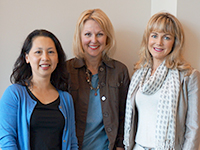Carb counting difficult, but necessary for people with diabetes
Even though carbohydrate counting is the most common method used by people with diabetes to determine how much insulin to take at mealtime, it remains a challenging but necessary task undertaken multiple times daily.

Clinical Dietitians and Research Challenge investigators (L-R): Sharon Leung, Terri Broughtonand Prue Haniak
A unique Vancouver Coastal Health (VCH) research mentorship and funding opportunity has allowed a team of clinical dietitians at Vancouver General Hospital’s Diabetes Centre to conduct a research project looking into the perceived barriers to carbohydrate counting for adults with diabetes on intensive insulin therapy.
Research team leader Sharon Leung and team members Terri Broughton, Prue Haniak and Amy Scott applied to the VCH Research Challenge in 2012.
“We were seeing patients have difficulties applying the carbohydrate counting method, especially in their daily lives over the long term,” says Leung. “We wanted to do the research but we weren’t sure how to go about it. As dietitians we learned more about quantitative research studies in our training – not qualitative.”
The VCH Research Challenge allowed the team to conduct research they otherwise would not have done. By learning and going through the different stages of conducting a research project, Leung, Broughton, Haniak and Scott identified six central themes that spoke to the barriers of carbohydrate counting from focus group participants.
Sharing results to overcome barriers
“Our study findings really highlighted how complex carbohydrate counting can be. One common finding across all focus groups was that dining out presented a lot of challenges,” explains Leung. “So we need to spend more time on problem solving around dining-out situations when we teach carbohydrate counting.”
With their study now complete the team is in the process of submitting an abstract to the Canadian Diabetes Association professional conference. They also recently presented their research findings to the VCH and PHC dietitians at their annual Dietetics In Action meeting and they hope to submit their manuscript to a professional journal.
“The Research Challenge gave us the confidence to do research that seemed quite intimidating,” Leung says. “Through the challenge we had the support and funding that helped in every step of our research process. We knew there was always someone we could turn to with questions or for advice.”
The VCH Research Challenge award is a joint venture between VCHRI and VCH Professional Practice.

